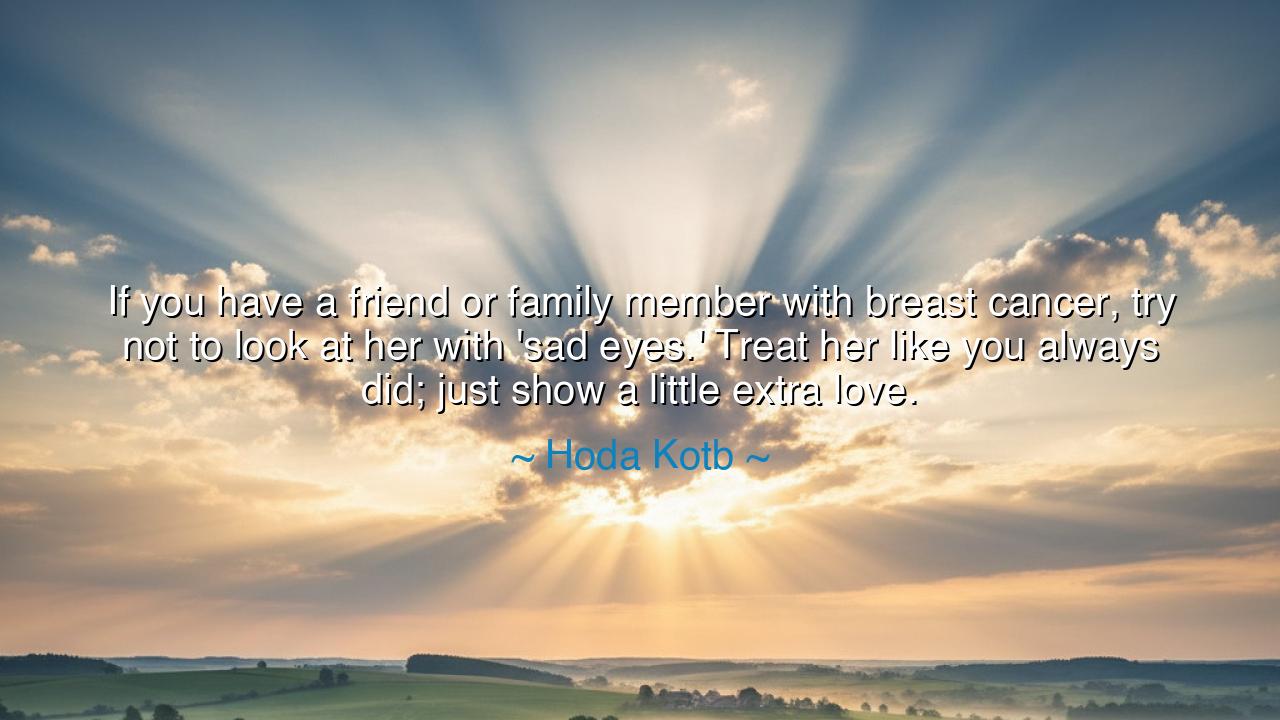
If you have a friend or family member with breast cancer, try not
If you have a friend or family member with breast cancer, try not to look at her with 'sad eyes.' Treat her like you always did; just show a little extra love.






Hearken, O seekers of wisdom, and attend to the words of Hoda Kotb, who speaks with the gentle clarity of one who has witnessed the fragility and resilience of life. “If you have a friend or family member with breast cancer, try not to look at her with ‘sad eyes.’” In this counsel lies a truth as old as human compassion itself: that suffering is not a mask to be stared upon with pity, but a human condition to be met with love, dignity, and presence. Kotb reminds us that the eyes that see should not weigh down the spirit of the afflicted, but lift it, affirming their humanity rather than their illness.
Her words underscore the power of normalcy and constancy in relationships. “Treat her like you always did; just show a little extra love,” she continues. Here is the delicate balance of empathy: acknowledging pain without letting it define the person. To gaze upon a loved one solely through the lens of sorrow is to diminish their essence. Instead, the heart must respond with warmth, care, and the quiet affirmation that their being is cherished, independent of circumstance.
Consider the story of Elizabeth Edwards, wife of the American politician John Edwards, who faced her battle with breast cancer publicly yet remained a vibrant force for family and advocacy. Those around her—friends, colleagues, and family—learned to embrace her fully, offering support and companionship without reducing her to her illness. In these actions, one observes the wisdom Kotb imparts: love is not measured by expressions of grief but by presence, encouragement, and unwavering humanity.
Kotb’s counsel also carries a lesson about the emotional impact of perception. The eyes and expressions we offer convey as much as words, sometimes more. A gaze heavy with pity can wound where intention aims to comfort. By consciously offering a gaze free of sadness, yet filled with love, one communicates strength, solidarity, and respect for the autonomy and dignity of the afflicted. It is a reminder that the heart’s approach shapes the soul’s reception.
History is filled with the quiet courage of those who offer such love. In ancient Athens, companions of the sick and elderly were expected to accompany them without fear or overt sorrow, providing gentle guidance, conversation, and affirmation. The healer Hippocrates taught that emotional support was inseparable from treatment: a patient’s spirit must be attended to with care as much as their body, for human resilience thrives on affirmation and connection. Kotb’s words echo this timeless principle, bringing it into the intimate sphere of family and friendship.
From this reflection emerges a lesson for all who listen: when facing the suffering of a loved one, let compassion be active, not passive. Love manifests in small gestures, consistent presence, and emotional steadiness, not in the weight of sorrow that risks overshadowing the individual. Treat the afflicted with the same regard, the same respect, and the same warmth you always offered, and then add just a measure more of tenderness, awareness, and attention.
Practical guidance flows naturally from Kotb’s wisdom. Be mindful of your expressions and demeanor; let your words and your eyes convey hope rather than despair. Listen attentively, share in moments of joy as well as struggle, and offer gestures of care that honor the person rather than the disease. In doing so, you become a source of strength, a living testament to the healing power of love, empathy, and constancy.
Thus, let the words of Hoda Kotb resonate through generations: suffering need not diminish the spirit of those we cherish. Meet them not with pity but with presence, not with sorrow but with love. In this simple yet profound practice, we honor their humanity, uphold their dignity, and discover that even amid illness, the heart can shine with courage, resilience, and enduring compassion.






AAdministratorAdministrator
Welcome, honored guests. Please leave a comment, we will respond soon